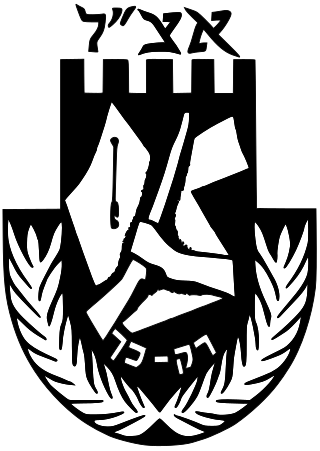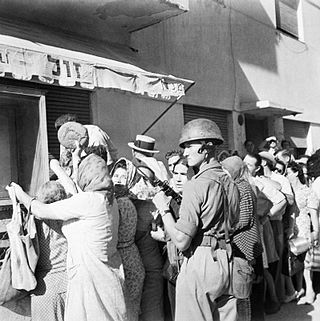
The Irgun, officially the National Military Organization in the Land of Israel, was a Zionist paramilitary organization that operated in Mandatory Palestine between 1931 and 1948. It was an offshoot of the older and larger Jewish paramilitary organization Haganah. The Irgun has been viewed as a terrorist organization or organization which carried out terrorist acts.

Zionist political violence refers to acts of violence or terrorism committed by Zionists in support of establishing and maintaining a Jewish state in Palestine. These actions have been carried out by individuals, paramilitary groups, and the Israeli government, from the early 20th century to the present day, as part of the ongoing Israeli-Palestinian conflict.
Haganah was the main Zionist paramilitary organization that operated for the Yishuv in the British Mandate for Palestine. It was founded in 1920 to defend the Yishuv's presence in the region, and was formally disbanded in 1948, when it became the core force integrated into the Israel Defense Forces shortly after the Israeli Declaration of Independence.
During the 1948 Palestine war, massacres and acts of terror were conducted by and against both sides. A campaign of massacres and violence against the Arab population, such as occurred at Lydda and Ramle and the Battle of Haifa, led to the expulsion and flight of over 700,000 Palestinians, with most of their urban areas being depopulated and destroyed. This violence and dispossession of the Palestinians is known today as the Nakba.

Operation Agatha, sometimes called Black Sabbath or Black Saturday because it began on the Jewish sabbath, was a police and military operation conducted by the British authorities in Mandatory Palestine. Soldiers and police searched for arms and made arrests in Jerusalem, Tel Aviv, Haifa and several dozen settlements; the Jewish Agency was raided. The total number of British security forces involved is variously reported as 10,000, 17,000, and 25,000. About 2,700 individuals were arrested, among them future Israeli Prime Minister Moshe Sharett. The officially given purpose of the operation was to end "the state of anarchy" then existing in Palestine. Other objectives included obtaining documentary proof of Jewish Agency approval of sabotage operations by the Palmach and of an alliance between the Haganah and the more violent Lehi and Irgun, destroying the Haganah's military power, boosting army morale and preventing a coup d'état being mounted by the Lehi and Irgun.

The Palmach was the elite combined strike forces and sayeret unit of the Haganah, the underground army of the Yishuv during the period of the British Mandate for Palestine. The Palmach was established in May 1941. By the outbreak of the 1948 Arab–Israeli War, it consisted of over 2,000 men and women in three fighting brigades and auxiliary aerial, naval and intelligence units. With the creation of Israel's army, the three Palmach Brigades were disbanded. This and political reasons compelled many of the senior Palmach officers to resign in 1950.
The Jewish Resistance Movement, also called the United Resistance Movement (URM), was an alliance of the Zionist paramilitary organizations Haganah, Irgun and Lehi in the British Mandate of Palestine. It was established in October 1945 by the Jewish Agency and operated for some ten months, until August 1946. The alliance coordinated acts of sabotage to undermine the British authority in Mandatory Palestine.

Palyam was the marines of the Palmach.
The Saison was the name given to the Haganah's attempt, as ordered by the official bodies of the pre-state Yishuv, to suppress the Irgun's insurgency against the government of the British Mandate in Palestine, from November 1944 to March 1945.

A successful paramilitary campaign, sometimes referred to as the Palestine Emergency, was carried out by Zionist underground groups against British rule in Mandatory Palestine from 1944 to 1948. The tensions between the Zionist underground and the British mandatory authorities rose from 1938 and intensified with the publication of the White Paper of 1939. The Paper outlined new government policies to place further restrictions on Jewish immigration and land purchases, and declared the intention of giving independence to Palestine, with an Arab majority, within ten years. Though World War II brought relative calm, tensions again escalated into an armed struggle towards the end of the war, when it became clear that the Axis powers were close to defeat.
The Night of the Bridges was a Haganah venture on the night of 16 to 17 June 1946 in the British Mandate of Palestine, as part of the Jewish insurgency in Palestine (1944–47). Its aim was to destroy eleven bridges linking Mandatory Palestine to the neighboring countries Lebanon, Syria, Transjordan and Egypt, in order to suspend the transportation routes used by the British Army. Attacks on a further three bridges had been considered, but were not executed.

The Deir Yassin massacre took place on April 9, 1948, when Zionist paramilitaries attacked the village of Deir Yassin near Jerusalem, Mandatory Palestine, killing at least 107 Palestinian Arab villagers, including women and children. The attack was conducted primarily by the Irgun and Lehi, who were supported by the Haganah and Palmach. The massacre was carried out despite the village having agreed to a non-aggression pact. It occurred during the 1947–1948 civil war and was a central component of the Nakba and the 1948 Palestinian expulsion and flight.

The 6th Airborne Division in Palestine was initially posted to the region as the Imperial Strategic Reserve. It was envisioned as a mobile peace keeping force, positioned to be able to respond quickly to any area of the British Empire. In fact the division became involved in an internal security role between 1945 and 1948.
Yaakov Banai born Yaakov Tunkel, Alias Mazal served as the commander of the Lehi movement's combat unit. Banai was a senior Lehi member who masterminded numerous military encounters against British and Arab targets during the Mandate period and the 1947–1949 Palestine war.

Amichai Paglin, codename "Gidi" was an Israeli businessman who served as Chief Operations Officer of the Irgun during the Mandate era. He planned and personally led numerous attacks against the British during the Jewish insurgency in Palestine, including the notorious King David Hotel bombing, commanded the battle to conquer Jaffa in the 1947–48 Civil War in Mandatory Palestine, and participated in the 1948 Arab–Israeli War. Following independence, he ran an industrial oven factory together with his father, and was later appointed Prime Minister Menachem Begin's counter-terrorism adviser. Only a few months after his appointment, however, Paglin died in a car crash.
Hamaas was a weekly publication of the Lehi, an armed Zionist militant group and self-described terrorist organization in Mandatory Palestine. Other publications by the Lehi included the daily Mivrak ('Telegram'), the monthly HaKhazit, and BaMahteret ('Underground').

Events in the year 1948 in the British Mandate of Palestine.
Operation Boatswain was the first of the operational missions carried out by the Palmach as part of the cooperation between the Jewish Yishuv in Mandatory Palestine and the British during World War II. The mission to sabotage oil refineries in Tripoli was unsuccessful, ending with the disappearance of 23 Palmach commandos and British SOE officer Major Sir Anthony Palmer, 4th Baronet after their boat was lost at sea on 18 May 1941.

Yehiel Dov Dresner was an Irgun member in pre-state Mandatory Palestine and one of 12 Olei Hagardom.









